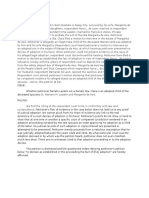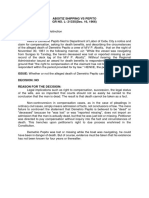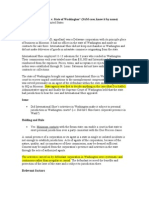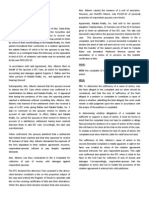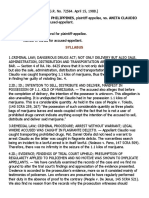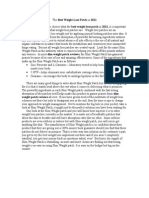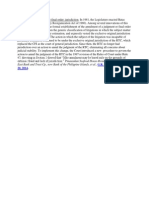Coles V Harsh
Coles V Harsh
Uploaded by
Jon SantosCopyright:
Available Formats
Coles V Harsh
Coles V Harsh
Uploaded by
Jon SantosOriginal Description:
Original Title
Copyright
Available Formats
Share this document
Did you find this document useful?
Is this content inappropriate?
Copyright:
Available Formats
Coles V Harsh
Coles V Harsh
Uploaded by
Jon SantosCopyright:
Available Formats
COLES v.
HARSH
Brief Fact Summary. Defendant, Oliver J. Coles, married the former wife of
Plaintiff, Chester Harsch. Plaintiff sued Defendant for alienating the
affections of his wife.
Synosis of !ule of "aw. # series of small evidentiary violations can
amount to a retrial.
Facts. Defendant was initially married to Plaintiff$s sister and hung out in
the same social circles as Plaintiff. One activity of the social circle was the
wrestling of men with each other$s wives. Plaintiff introduced evidence that
Defendant$s attention to Plaintiff$s wife was %eyond the norm for their circle,
and it led to the divorce of Plaintiff and his wife, whom Defendant married
shortly thereafter.
&ssue. 'here are several issues resented in this case.
'he first issue is whether a roer foundation was laid for Plaintiff$s
imeachment of a defense witness.
'he second issue is whether it was harmless error to e(clude evidence that
related to the conduct of the wrestling social circle.
'he third issue is whether Plaintiff could introduce an imeaching )uestion
on a collateral matter, or additional evidence of collateral matters.
Held. 'he court made the following holdings.
'he foundation was not roer and was irreversi%le error. 'he witness was
only as*ed whether he remem%ered a conversation without any additional
foundation.
'he Court found that the e(clusion of evidence to further demonstrate the
wrestling activities was no error or harmless error. 'he court reasoned that
a +uror would tyically understand that the conduct would inflate the
li*elihood that Defendant and the wife would %ond.
'he court held that Plaintiff can not )uestion Defendant on a collateral
matter +ust to catch Defendant in a lie. Further the admission of affidavits
was not admissi%le.
Discussion. 'he court delivered a laundry list of evidentiary mishas from
the lower court. 'he common thread is that evidence urorted to fall under
one evidentiary ruling will not %e allowed when the evidence is o%viously
meant to %e more re+udicial than relevant.
You might also like
- Evidence Outline UT LawDocument95 pagesEvidence Outline UT LawsamcriswellNo ratings yet
- Lazatin Vs CamposDocument1 pageLazatin Vs CamposRomela CepedaNo ratings yet
- VAT ModuleDocument50 pagesVAT ModuleRovi Anne IgoyNo ratings yet
- Scra Crim 2Document31 pagesScra Crim 2Tricia PalileoNo ratings yet
- Plaintiff-Appellee Vs Vs Defendants-Appellants Paulino Gullas, Attorney-General JaranillaDocument3 pagesPlaintiff-Appellee Vs Vs Defendants-Appellants Paulino Gullas, Attorney-General JaranillasobranggandakoNo ratings yet
- LTD TolentinofinalsDocument3 pagesLTD TolentinofinalsevilsageNo ratings yet
- PP Vs AbapoDocument4 pagesPP Vs Abapogeorgina6160% (1)
- OBJECTIONSDocument5 pagesOBJECTIONSKathrine Chin LuNo ratings yet
- Balsamo v. People G.R. No. 260109 April 12 2023Document10 pagesBalsamo v. People G.R. No. 260109 April 12 2023Wolfgang Amadeus MozNo ratings yet
- Case Digest Case No. 5 Case No. 6Document3 pagesCase Digest Case No. 5 Case No. 6carl fuerzasNo ratings yet
- Legal Medicine: By: Vincent MisalangDocument38 pagesLegal Medicine: By: Vincent MisalangVincentNo ratings yet
- Prima Facie Prima Facie: CA, G.R. No. 134853, Feb. 24, 1998)Document3 pagesPrima Facie Prima Facie: CA, G.R. No. 134853, Feb. 24, 1998)JianmNo ratings yet
- Rule 132 - Group6Document23 pagesRule 132 - Group6Denz Christian ResentesNo ratings yet
- PEOPLE Vs EntilaDocument1 pagePEOPLE Vs EntilaMa Lorely Liban-CanapiNo ratings yet
- People vs. EspinozaDocument1 pagePeople vs. EspinozaLe AnnNo ratings yet
- Agpalo 1Document93 pagesAgpalo 1sujeeNo ratings yet
- Galman V Pamaran en Banc G.R. Nos. 71208-09 August 30 1985Document77 pagesGalman V Pamaran en Banc G.R. Nos. 71208-09 August 30 1985herbs22225847No ratings yet
- 10 Jessette Amihope N Castor Nepomuceno Vs LopezDocument2 pages10 Jessette Amihope N Castor Nepomuceno Vs LopezYna NovoNo ratings yet
- Bar Exams Legal EthicsDocument43 pagesBar Exams Legal EthicsRace Patam KiNo ratings yet
- Widows and Orphans Association Vs CADocument5 pagesWidows and Orphans Association Vs CAM Azeneth JJNo ratings yet
- Jesus Disini Vs SandiganbayanDocument3 pagesJesus Disini Vs SandiganbayanAtheena Marie PalomariaNo ratings yet
- RA 9208 DigestDocument3 pagesRA 9208 DigestYajra WorldNo ratings yet
- Case122 Aboitiz Vs Pepito DigestDocument1 pageCase122 Aboitiz Vs Pepito DigestCayen Cervancia CabiguenNo ratings yet
- People v. de Guzman (Evident Premeditation)Document1 pagePeople v. de Guzman (Evident Premeditation)Zen FerrerNo ratings yet
- Evidence Questions 1995-1997Document4 pagesEvidence Questions 1995-1997Shalini Kristy S DalisNo ratings yet
- Estate and Donors Tax Dela CalzadaDocument12 pagesEstate and Donors Tax Dela CalzadaStephen CabalteraNo ratings yet
- Leynes Vs PeopleDocument8 pagesLeynes Vs PeopleCyber QuestNo ratings yet
- Evidence Case DigestDocument19 pagesEvidence Case DigestWeng CuevillasNo ratings yet
- 13 Alva v. High Capacity Security ForceDocument1 page13 Alva v. High Capacity Security ForceBhianca Ruth MauricioNo ratings yet
- Int'l Shoe Co. V State of Washington (Minimal Contacts & Jurisdiction)Document2 pagesInt'l Shoe Co. V State of Washington (Minimal Contacts & Jurisdiction)asklaw1No ratings yet
- People v. VallejoDocument3 pagesPeople v. VallejoJoshua Joy CoNo ratings yet
- Evidence TSN 1st Exam CoverageDocument30 pagesEvidence TSN 1st Exam CoverageMa Gloria Trinidad ArafolNo ratings yet
- Ison v. PeopleDocument19 pagesIson v. PeopleKian FajardoNo ratings yet
- ART 333 To ART 343 RPC BOOK II REVIEWERDocument9 pagesART 333 To ART 343 RPC BOOK II REVIEWERIG5625No ratings yet
- Petitioners vs. VS.: en BancDocument45 pagesPetitioners vs. VS.: en BancDuffy DuffyNo ratings yet
- Negotiable Instruments Law DigestsDocument4 pagesNegotiable Instruments Law DigestsJay-ar Rivera BadulisNo ratings yet
- Evidence ReviewerDocument6 pagesEvidence ReviewerZendy PastoralNo ratings yet
- MWSS Vs CADocument4 pagesMWSS Vs CAInez Monika Carreon PadaoNo ratings yet
- Willamette V MuzalDocument2 pagesWillamette V MuzalBrian LacorteNo ratings yet
- Notes Crim2Document46 pagesNotes Crim2TAU MU OFFICIAL100% (1)
- Temistocles Tapdasan, JR., Petitioner, vs. People of The Philippines and Spouses Luisito and Juanita BORJA, RespondentsDocument9 pagesTemistocles Tapdasan, JR., Petitioner, vs. People of The Philippines and Spouses Luisito and Juanita BORJA, Respondentsshaye587No ratings yet
- Evidence, F) Conduct and Character Case People Vs NardoDocument2 pagesEvidence, F) Conduct and Character Case People Vs NardoMar Jan Guy50% (2)
- Cyber Law Sample QuestionDocument36 pagesCyber Law Sample QuestionAntonio GenetaNo ratings yet
- Crim People VS GodoyDocument24 pagesCrim People VS GodoyJesa Formaran50% (2)
- Second Succession CaseDocument8 pagesSecond Succession Caselaw abad raNo ratings yet
- 2nd Exam Case DigestDocument31 pages2nd Exam Case DigestbubblingbrookNo ratings yet
- PEOPLE OF THE PHILIPPINES, Plaintiff-Appellee, vs. ANITA CLAUDIO Y BAGTANG, Accused-AppellantDocument10 pagesPEOPLE OF THE PHILIPPINES, Plaintiff-Appellee, vs. ANITA CLAUDIO Y BAGTANG, Accused-AppellantbreeH20No ratings yet
- Writ of Amparo and DataDocument7 pagesWrit of Amparo and DataIkaw Na NgaNo ratings yet
- Family Reputation or Tradition Regarding PedigreeDocument12 pagesFamily Reputation or Tradition Regarding PedigreeNate Abbagu FloresNo ratings yet
- Prosecutor V. Pavle Strugar, Case No. It-01-42-A,: Judgement, 17 July 2008Document16 pagesProsecutor V. Pavle Strugar, Case No. It-01-42-A,: Judgement, 17 July 2008Mirriam EbreoNo ratings yet
- Rule 89-91Document10 pagesRule 89-91Bea Charisse MaravillaNo ratings yet
- Special Proceedings SY 2019-2020 Semestral ExaminationDocument5 pagesSpecial Proceedings SY 2019-2020 Semestral ExaminationRalph Ronald CatipayNo ratings yet
- Pozar Gregory James Vs Court of AppealsDocument8 pagesPozar Gregory James Vs Court of AppealsDane DagatanNo ratings yet
- Cases in Wills and SuccessionDocument3 pagesCases in Wills and SuccessionMar TinNo ratings yet
- Manulat Jr. V People GR 190892 ScraDocument24 pagesManulat Jr. V People GR 190892 ScraJesus Angelo Diosana100% (1)
- 4) Habeas CorpusDocument9 pages4) Habeas CorpusPaul EsparagozaNo ratings yet
- Legal Forms Case DigestsDocument11 pagesLegal Forms Case DigestsMamo ChanNo ratings yet
- Rules On EvidenceDocument17 pagesRules On EvidenceMarvie FrandoNo ratings yet
- LAW232 EVIDENCE Case Notes Set 2 (Topics 3-6)Document45 pagesLAW232 EVIDENCE Case Notes Set 2 (Topics 3-6)Allen MoyoNo ratings yet
- Cool v. United States, 409 U.S. 100 (1972)Document7 pagesCool v. United States, 409 U.S. 100 (1972)Scribd Government DocsNo ratings yet
- Green Lipped Mussel Powder: A Miracle FoodDocument2 pagesGreen Lipped Mussel Powder: A Miracle FoodJon SantosNo ratings yet
- Weight Patch Reviews All Over. If You Have Grown Tired of The Multitude of Weight LossDocument1 pageWeight Patch Reviews All Over. If You Have Grown Tired of The Multitude of Weight LossJon SantosNo ratings yet
- Art.4.Nursing Schools in FloridaDocument1 pageArt.4.Nursing Schools in FloridaJon SantosNo ratings yet
- The Best AthleteDocument1 pageThe Best AthleteJon SantosNo ratings yet
- V. Roxas Electric and Construction Company, Inc. The Court Stated That "Persons Dealing With AnDocument1 pageV. Roxas Electric and Construction Company, Inc. The Court Stated That "Persons Dealing With AnJon SantosNo ratings yet
- Republic Act 10366Document4 pagesRepublic Act 10366Jon SantosNo ratings yet
- Article.2.Why Take Green Lipped Mussel PowderDocument2 pagesArticle.2.Why Take Green Lipped Mussel PowderJon SantosNo ratings yet
- Pinausakan v. Far EastDocument1 pagePinausakan v. Far EastJon SantosNo ratings yet
- Remedies of A Lessor: As A Lessor of Property He/she Has The Right To Use The Remedy of Filing An Ejectment CaseDocument8 pagesRemedies of A Lessor: As A Lessor of Property He/she Has The Right To Use The Remedy of Filing An Ejectment CaseJon SantosNo ratings yet
- United Pacific, Inc. and Skippers Maritime Services, Inc. Ltd. vs. Nathaniel Doza, Et Al.Document1 pageUnited Pacific, Inc. and Skippers Maritime Services, Inc. Ltd. vs. Nathaniel Doza, Et Al.Jon SantosNo ratings yet
- Condominium ActDocument12 pagesCondominium ActJon SantosNo ratings yet
- Unson v. LacsonDocument9 pagesUnson v. LacsonJon SantosNo ratings yet
- 15 Cebu Contractors v. CADocument4 pages15 Cebu Contractors v. CAJon SantosNo ratings yet
- Emmanuel Pelaez v. Auditor GeneralDocument13 pagesEmmanuel Pelaez v. Auditor GeneralJon SantosNo ratings yet
- Unson v. LacsonDocument9 pagesUnson v. LacsonJon SantosNo ratings yet
- Dadole v. COADocument14 pagesDadole v. COAJon SantosNo ratings yet
- ZYHL29QAOB - Amazon Product ReviewsDocument1 pageZYHL29QAOB - Amazon Product ReviewsJon SantosNo ratings yet
- ACORD v. ZamoraDocument14 pagesACORD v. ZamoraJon SantosNo ratings yet
- Writ of Amparo - MendozaDocument7 pagesWrit of Amparo - MendozaJon SantosNo ratings yet

